Highlights from our Annual Conference
Our hybrid Annual Conference Back to the Future – how should employers respond to ‘the new normal’?, sponsored by NatWest, took place on Wednesday 28 June 2023 and was attended by over 500 people. If you weren’t able to join us, here we share some of the highlights and key takeaways from the conference.
Many more businesses are recognising the real value that diverse teams bring and realising they cannot afford to exclude any part of the talent pool. This is partly about skills shortages at a time when employers are struggling to fill vacancies in sectors ranging from health and social care to hospitality and tech, but also about rapidly changing needs from business and demands from customers which mean a more diverse skill set is needed – creativity, innovation, problem solving and more.
But increasing the diversity of our organisations won’t just happen by itself. We need a concerted and intentional effort to raise aspirations of young disabled people, provide better support through all key life stages and ensure that they can “see who they want to be” with disabled role models across business. And we need employers to rethink how they recruit to open up opportunities to disabled talent of all ages.
During the conference we explored the challenges that disabled people face in getting into and staying in work and practical solutions for businesses to action.

First up we were joined by video for a welcome by Alison Rose CEO of NatWest Group (the conference sponsors) and then Oliver Holbourn, CEO at RBS International.
Watch an interview with Diane Lightfoot , CEO at BDF and Oliver Holbourn

We were joined by Viscount Younger of Leckie who stepped in to replace The Minister for Disabled People, Tom Pursglove MP. He talked about Government intentions to personalise Jobcentre support for disabled people and their work with employers to improve the provision of occupational health for employees.
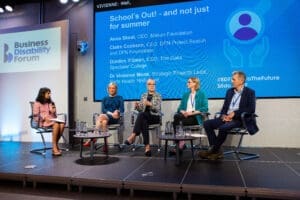
School’s Out! – and not just for summer focused on the experiences of young disabled people seeking work.
Claire Cookson, CEO, DFN Project SEARCH and DFN Foundation shared the depressing statistic that only 4.8% of young people with a learning disability are in paid employment. Project SEARCH places young people with learning disabilities and autism in businesses from a wide range of sectors and industries. Interns spend a year with the businesses which acts as a ‘skills laboratory’. Very encouragingly, 70% of Project SEARCH’s intern graduates get a paid job after the year and 60% a full-time job.
Clare was joined by Dr Vivienne Monk, Strategic Projects Lead at Barts NHS Trust where they are planning to double the number of Project SEARCH interns next year. Interns do a wide variety of roles in the hospital, outside of stereotypical assumptions; one recent graduate intern now works in their cath lab. Her recommendation for getting this embedded was “to go straight to the top – get senior buy-in”
Anna Skeats, CEO, Mason Foundation and Gordon Tillman, CEO, The Oaks Specialist College talked about Project Propel, their collaboration which secures jobs for young people with learning disabilities by providing the tools, skills and practical know-how to help businesses “embed a culture of inclusivity” and make the necessary cultural shift to employ young people with learning disabilities. Every organisation has entry level roles to offer young people with disabilities, and as Vivienne Monk noted, “it financially makes a lot of sense too.”
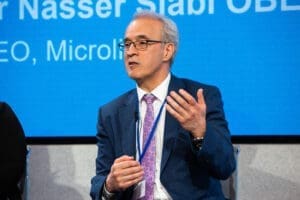
Adjustments for Life – how to make the world of work wonderful focussed on BDF’s recently launched Great Big Workplace Adjustments Survey 2023. Angela Matthews, Head of Policy and Research at BDF and Nasser Siabi, CEO at Microlink (sponsors of the survey) took us through the key findings of the research.
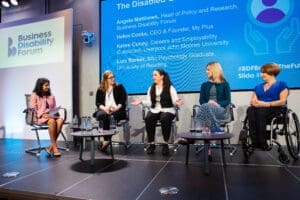
In The Disabled Graduate session we were joined by Helen Cooke, CEO & Founder, MyPlus, Keren Coney, Careers and Employability Consultant, Liverpool John Moores University , Lois Barker, BSc Psychology Graduate, University of Reading and Angela Matthews, Head of Policy at BDF.
Angela Matthews shared some of the specific findings from disabled graduate respondents to The Great Big Workplace Adjustments Survey 2023 about the transition experience of moving from university to employment. The research shows that disabled graduates often expect to be able to continue working as they did at university, only to encounter completely different rules, adjustments and ways of working at work. You can read more about the findings here.
Employers must stress their inclusive credentials to attract disabled talent. And both universities and employers need to address the fear many disabled students feel about work and how they will be supported when they get there – concerns that are often unfortunately justified.
It was agreed that workplace adjustment passports are potentially good, but flawed in practice and can lead both applicants and recruiters into difficult legal territory. At all times, conversations should focus on what barriers an applicant or employee needs, not on conditions.
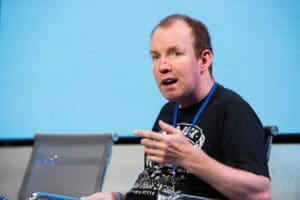
We were delighted to welcome comedian and winner of Britain’s Got Talent 2018, Lee Ridley AKA Lost Voice Guy. Totally hilarious, in particular the Kylie Minogue bit….you had to be there! (Lost Voice Guy’s full set will shortly be available on the Knowledge Hub for BDF Members and Partners to access.)
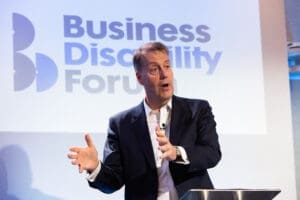
We know that older people are leaving the workplace in droves and that the inactivity of over 50s is a key policy focus for Government. In Retaining older workers – mission impossible? We heard from Andy Briggs, CEO of the Phoenix Group, on what’s needed to buck the trend and create an environment where older workers not only need to work but want to.
In the UK as in much of the world, we have an ageing population and over 30% of the working age population are over 50 years old. A high percentage of individuals won’t have a decent retirement income and this is likely much higher for those with disabilities or long-term conditions. Many people will acquire a disability in later years and more people are having to balance work with caring responsibilities.
Andy called on everyone to “rethink our ways of working to avoid a significant economic burden”. He urged Government to think about the impacts of this longevity across departments to unlock the benefits of utilising the talents of everyone in the country; employers to change their ways of working to adapt to 5 generations of diverse talent in the workplace and individuals to embrace a very different pattern of working life to their parents.
Andy shared some Phoenix Insights research with recommendations that included reform of the state pension system, actions for business such as encouraging and creating routes to meaningful employment without restrictive criteria that present barriers to disabled or older people, really focussing on talent to fill skills gaps, explicit actions to support the health and wellbeing of older workers and offering flexibility and work policies that respond to the needs of 5 generations of workers within a business.
However, Andy strongly emphasised that, “None of this works without cultural consistency – do your actions live up to your words?” The behaviour of the direct line manager is crucial in whether an employee is retained but the tone from the senior leadership is key too.
Read more highlights from the session “Retaining older disabled workers – mission impossible?”

In The circle of life – who cares? our panelists – all carers themselves – were Natalie Quilter – Diversity, Inclusion and Wellbeing Lead & Chair of Carers Network, Notting Hill Genesis and 2022 Finalist Young Person of the Year; Eleni Katsoulis, Internal Audit, Natwest Group and Carers Co-ordinator, HomeLife Network, NatWest; Chantel Emery, BDF and Daniel Cadey, BDF.
More of us are carers than we realise, but not everyone uses the term; most of us will be a carer at some point in our lives. Our panellists shared that the moment you discover you are a carer is a key one, but “on average it takes someone around two years to realise they’re a carer.”
The experience and challenges of combining being a carer and work can be very different depending on the nature of your job and sometimes requires a change in role or career direction. Eleni’s move from a customer-facing environment was “a definite choice” so she could manage her caring responsibilities.
Employer support is vital to keep carers in the workplace. Dan shared that the compassion of his team and line managers was vital and the need for it to be an ongoing conversation as things change. Carers’ situations are complex and working from home is not a panacea for all. Many carers see working from an office, away from caring pressures at home, as an opportunity to wear a different hat and focus on themselves, and get peer support. For many carers, “going to work is me-time” but there is an added stress in that “being a carer is unpredictable…you don’t know when it’s going to happen. Carer’s leave asks in advance, how much time will you need, but it’s unpredictable.”
60% of carers have a disability or health condition themselves. Natalie highlighted that “individualised support is so important especially for those balancing having a disability and being a carer themselves.”
Some of the key takeaways from this session were the importance of Employee Resource Groups for peer support for carers, going over and above legal requirements for adjustments for carers to support them at work, considering adding carers as a characteristic section in impact assessments and being careful not to lump family-friendly policies in with policies designed to help carers.
Read more highlights from the session “The circle of life – who cares?”

In the final session, Disability and the new normal, we looked at the global perspective with John McCalla-Leacy, Head of Global ESG, KPMG International and Head of ESG, KPMG in the UK, who talked about the challenges faced by businesses that want to recruit and retain disabled people, practical solutions for business and what, if anything, is different in the UK.
John shared that the current focus of businesses’ ESG (Environment Social Government) functions is very much ‘social’ but that this is the in context of larger pressures – the three Cs: conflict (Ukraine), climate and cost of living. He also talked about the power of leaders coming closer to their staff – sharing their own disability story or disability-related experiences offering a ‘Spartacus effect’ which gives other senior leaders and staff ‘permission’ to share their stories too. When framing discussions about disability inclusion John urged discussion to be framed as must (compliance, law, necessity), could (potential strategic or operational things a business can do), and should (coming from deep altruistic sense of ‘doing the right thing’). With the Corporate Sustainability Reporting Directive on its way, which will require more reporting on the nature of the workforce, he encouraged businesses to embrace this change and its challenges, to build more inclusive workforces.